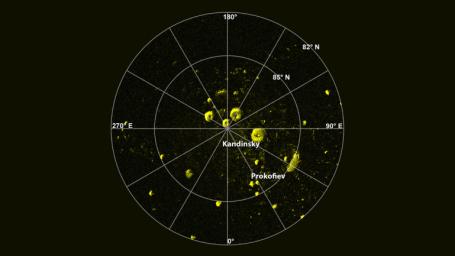
|
Radar Image of Mercury’s North Pole
- Click the image above for a larger view
- Full-Res JPEG (1280 x 720) (85.1 kB)
- Full-Res TIFF (1280 x 720) (2.8 MB)
Caption:
A radar image of Mercury's north polar region acquired by the Arecibo Observatory. Yellow areas denote regions of high radar reflectivity. Since their discovery in 1992, these polar deposits have been hypothesized to consist of water ice trapped in permanently shadowed areas near Mercury's north and south pole, but other explanations for the polar deposits have also been suggested. Polar stereographic projection. From J. K. Harmon et al., Icarus , 211 , 37-50 (2011).
Background Info:
The MESSENGER spacecraft is the first ever to orbit the planet Mercury, and the spacecraft's seven scientific instruments and radio science investigation are unraveling the history and evolution of the Solar System's innermost planet. Visit the Why Mercury? section of this website to learn more about the key science questions that the MESSENGER mission is addressing. During the one-year primary mission, MDIS acquired 88,746 images and extensive other data sets. MESSENGER is now in a year-long extended mission, during which plans call for the acquisition of more than 80,000 additional images to support MESSENGER's science goals.
For information regarding the use of images, see the MESSENGER image use policy .
Cataloging Keywords:
| Name | Value | Additional Values |
|---|---|---|
| Target | Mercury | |
| System | ||
| Target Type | Planet | |
| Mission | MESSENGER | National Astronomy and Ionosphere Center (NAIC) |
| Instrument Host | MESSENGER | Arecibo Observatory |
| Host Type | Orbiter | Ground-Based Observatory |
| Instrument | Arecibo Radar | |
| Detector | ||
| Extra Keywords | Color, Radar, Radio, Shadow, Water | |
| Acquisition Date | ||
| Release Date | 2012-11-29 | |
| Date in Caption | ||
| Image Credit | NASA/Johns Hopkins University Applied Physics Laboratory/Carnegie Institution of Washington/National Astronomy and Ionosphere Center, Arecibo Observatory | |
| Source | photojournal.jpl.nasa.gov/catalog/PIA16514 | |
| Identifier | PIA16514 | |
